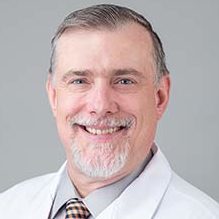Vascular & Endovascular Surgery Division
About
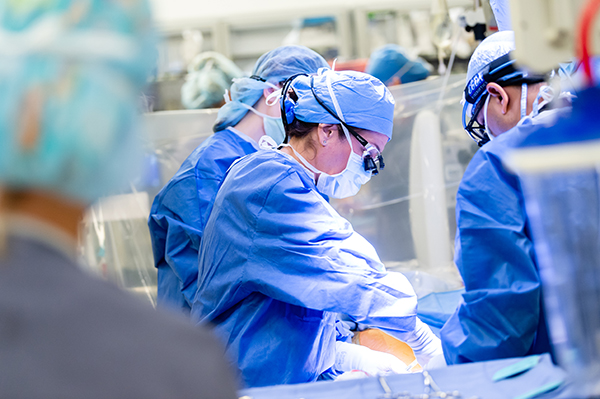 The Division of Vascular & Endovascular Surgery team at the University of Virginia provides comprehensive, cutting edge care to patients with vascular diseases. We pledge to provide the highest quality care based on clinical standards and novel therapies rooted in research and outcomes study while maintaining respect and compassion for our patients and their families.
The Division of Vascular & Endovascular Surgery team at the University of Virginia provides comprehensive, cutting edge care to patients with vascular diseases. We pledge to provide the highest quality care based on clinical standards and novel therapies rooted in research and outcomes study while maintaining respect and compassion for our patients and their families.
We have tremendous and broad experience in managing problems of the blood vessels. These range from peripheral artery disease, carotid artery stenosis, mesenteric and renal artery disease, arterial and aortic aneurysms through arterial and aortic dissection. We care for patients with venous disorders such as varicose veins and venous insufficiency. We also have expertise in rare and complex entities such as thoracic outlet, vascular compression syndromes, and non-atherosclerotic arterial diseases such as endofibrosis in athletes. We offer advanced techniques of vascular surgery including angioplasty, intra-arterial stents, minimally invasive surgery and fenestrated endografting.
Our doctors are among the best in the country, trained in the spectrum of open surgery and endovascular, minimally invasive techniques to treat diseases of the arteries and veins. We provide state-of-the-art care technologies, are actively engaged in numerous clinical trials and take pride in our vascular and endovascular surgery educational programs.
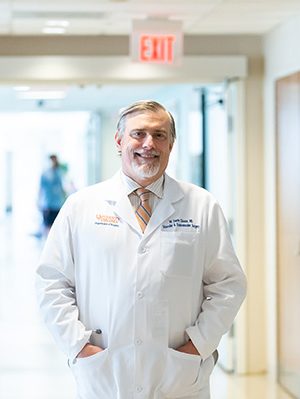 Welcome!
Welcome!
Our mission at the University of Virginia Division of Vascular & Endovascular surgery is to provide world-class, innovative open surgical, hybrid, and endovascular treatments for patients with vascular disease. The needs of the patient are our focus. We offer the spectrum of minimally invasive, advanced endovascular procedures, yet remain engaged and skilled in open surgical reconstruction for those who need it.
Along with this, excellence in vascular education, renowned clinical outcomes research, quality and efficiency, as well as leadership in vascular health policies are critical in allowing us to fortify this focus and enrich care of our patients.
We collaborate closely with multiple specialties including cardiac surgery, cardiology, vascular medicine, and interventional radiology to deliver streamlined comprehensive, multidisciplinary cardiovascular treatment in the UVA Heart and Vascular Center and its care center structure.
Our vascular and endovascular surgery fellowship program is one of the best in the country with an outstanding all-around experience. I encourage you to visit our fellowship website.
In constant pursuit of advancement, we participate in the regional Virginias Vascular Study Group (VVSG) and the national Vascular Quality Initiative (VQI) of the Society for Vascular Surgery Patient Safety Organization (SVS/PSO), as well as the National Surgical Quality Improvement Program (NSQIP). Our own Vascular and Endovascular Surgery Outcomes Collaborative (VESOC), Vascular Quality and Safety Team (VQST), and translational laboratories allow us internal mechanisms to identify opportunities to improve quality and academic study. We are active in national and international clinical trials involving novel devices and treatments for peripheral arterial disease, arterial trauma, aortic aneurysms and aortic dissection. Visit our department research site to find out more.
At UVA Vascular & Endovascular Surgery we are continually working to improve care for our patients, and serve our university, local, regional, national and international communities. Whether you are a patient, referring provider, student, resident or industry partner, we thank you for your interest.
Please contact me if you have questions about our programs.
Darrin Clouse, MD
Chief, Vascular & Endovascular Surgery Division
Professor of Surgery
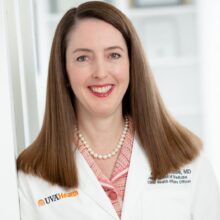
Melina R. Kibbe, MD, FACS, FAHA
Dean of the UVA School of Medicine, Professor of Surgery & Professor of Biomedical Engineering
Read Dr. Kibbe’s Full Profile
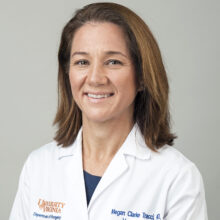
Margaret C. Tracci, MD
Professor
Read Dr. Tracci’s Full Bio

Behzad Farivar, MD
Associate Professor
Read Dr. Farivar’s Full Bio
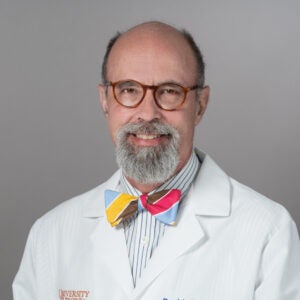
David Cassada, MD
Associate Professor of Surgery
Read Dr. Cassada’s Full Profile
Clinical Programs
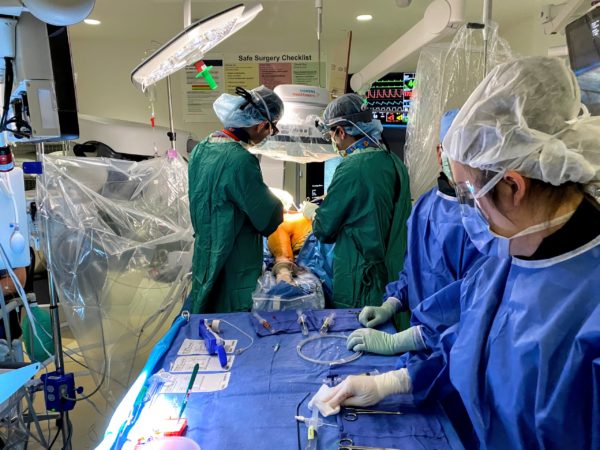 Our clinical programs provide comprehensive diagnostic, endovascular and surgical treatments for diseases of the arteries and veins. The vascular and endovascular surgery team at UVA begins with our Heart and Vascular Center (HVC) Surgical Clinic where, in conjunction with our surgeons, the nurse clinicians, physician’s assistants and vascular diagnostic laboratory review and care for each patient individually. The need for medical management, or surgical intervention is determined and all care coordinated. When intervention is recommended our award winning team in the hybrid operating rooms, and on our HVC inpatient units are there for you. Most patients with vascular diseases require longitudinal care, regardless of need for operation. We greatly enjoy and excel at monitoring you periodically.
Our clinical programs provide comprehensive diagnostic, endovascular and surgical treatments for diseases of the arteries and veins. The vascular and endovascular surgery team at UVA begins with our Heart and Vascular Center (HVC) Surgical Clinic where, in conjunction with our surgeons, the nurse clinicians, physician’s assistants and vascular diagnostic laboratory review and care for each patient individually. The need for medical management, or surgical intervention is determined and all care coordinated. When intervention is recommended our award winning team in the hybrid operating rooms, and on our HVC inpatient units are there for you. Most patients with vascular diseases require longitudinal care, regardless of need for operation. We greatly enjoy and excel at monitoring you periodically.
Aortic aneurysms and aortic dissection can affect the entire aorta from the valve in the heart to the arteries supplying the legs and everywhere in between. These require a cohesive team to provide state-of-the-art therapies. Vascular and endovascular surgery, as a cornerstone with cardiac surgery, form this group’s foundation. Vascular medical specialists, cardiologists, and interventional radiologists provide multidisciplinary insights and skill in managing all aspects of aortic care. The UVA Aortic Alert Program allows ease of transfer and rapid consultation.
Carotid Artery Stenosis
Treatment of carotid artery stenosis can prevent risk of primary or recurrent stroke. We provide comprehensive carotid care with expert insights into need for revascularization. When recommended, we perform carotid endarterectomy, carotid angioplasty and stenting, as well as the latest modality to perform stent placement, trans-carotid artery revascularization (TCAR) with flow reversal cerebral protection, through a small incision in the neck. More rarely, vertebral artery disease may need to be addressed.
Supra-Aortic Trunk Stenosis
The branches of the aortic arch include the innominate, or brachiocephalic artery, and the common carotid and subclavian arteries. Diseases in these locations can lead to stroke, transient ischemic attack, upper extremity symptoms, or vertebral and coronary steal syndromes. Surgical, endovascular and hybrid treatment of these lesions is a concentration of our team.
Peripheral Artery Diseases
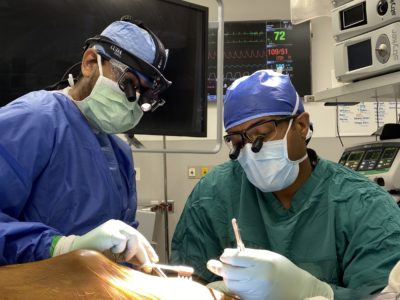 Peripheral artery disease due to atherosclerosis can cause claudication and life-style limiting pain. It can also progress to chronic limb threatening ischemia with tissue loss. Acute limb ischemia from thrombosis or embolization requiring urgent or emergent care can occur. Aneurysms in extremity arteries due to atherosclerosis and degeneration are common. Treatment may include surveillance and medical risk-modification or endovascular intervention, open surgical reconstruction, and hybrid procedures incorporating both to treat any of these entities.
Peripheral artery disease due to atherosclerosis can cause claudication and life-style limiting pain. It can also progress to chronic limb threatening ischemia with tissue loss. Acute limb ischemia from thrombosis or embolization requiring urgent or emergent care can occur. Aneurysms in extremity arteries due to atherosclerosis and degeneration are common. Treatment may include surveillance and medical risk-modification or endovascular intervention, open surgical reconstruction, and hybrid procedures incorporating both to treat any of these entities.
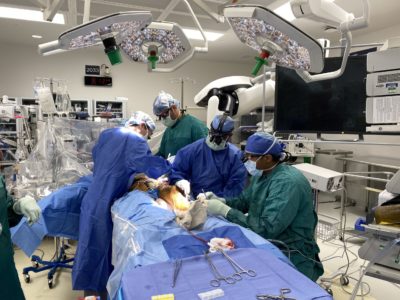
Arterial Disease in Athletes and the Young
Less frequent pathologies causing limb ischemia are anatomic and functional popliteal entrapment, arterial adventitial cystic disease, and endofibrosis in distance cyclists and endurance athletes. UVA vascular and endovascular surgery has specific expertise in treating and caring longitudinally for these unique vascular diseases.
Thoracic Outlet Syndrome
Arterial, venous and neurogenic compression in the thoracic outlet between the shoulder and chest can cause aneurysm formation, thromboembolization, venous thrombosis, or acute and chronic pain. When this happens this is called thoracic outlet syndrome (TOS). Once diagnosed, decompression with rib and muscle resection are warranted. Thrombolysis with venous reconstruction, or arterial reconstruction may accompany these depending on the affected structures. Our UVA team is recognized for its specialty care in this clinical arena.
Abdominal aortic branch disease, or renovisceral artery disease, may have many important signs and symptoms. We have considerable understanding of the diagnostic modalities and treatment strategies for these disorders. Endovascular, catheter-based, procedures and/or open surgical reconstruction may be needed. We are ready and skilled in management.
Renal Artery Stenosis
Renal artery narrowing, or stenosis, is usually due to atherosclerosis and may lead to difficulty in hypertension control, or decreased renal function. Aneurysms of the renal artery may occur and can also cause hypertension and have a risk of rupture.
Mesenteric Artery Stenosis
Stenosis of the celiac axis, superior mesenteric artery (SMA), or the inferior mesenteric artery (IMA) can cause pain with eating, called intestinal angina, nausea, or diarrhea. This is chronic mesenteric ischemia (CMI) and when these symptoms occur revascularization is required. UVA has specialized expertise to treat CMI. Acute thrombotic events in patients with pre-existing stenosis of these vessels, or emboli from a cardiac or aortic origin can lead to acute mesenteric ischemia (AMI), which is time-sensitive and life threatening. Our team, along with other surgical and interventional groups, is developing an AMI alert and response team to provide rapid treatment and improve outcomes.
Median Arcuate Ligament Syndrome
Rarer entities affecting the visceral vessels may include inflammation of the blood vessels or compression. One such process is called median arcuate ligament syndrome (MALS). This may cause abdominal discomforts, but requires specialized diagnosis and understanding of all treatment methods. UVA vascular and endovascular surgery is a recognized center in MALS care.
The UVA Vein Center focuses on diseases involve the venous system. Varicose veins, spider veins, venous thrombosis, chronic venous insufficiency, and venous syndromes of compression, including the iliac, renal and ovarian veins, are common and our multidisciplinary team of vein specialists is ready to care for vein health needs. The latest ablation and catheter-based techniques, sclerotherapy, and open surgery when needed, are all part of trusted UVA comprehensive vein care.
Education and Training
Vascular Surgery Fellowship
Learn MoreAt the University of Virginia we participate in the vascular surgical fellowship match coordinated through the NRMP. We have up to (2) two positions annually and accept applications via ERAS system during the fellowship match season which runs December – April.
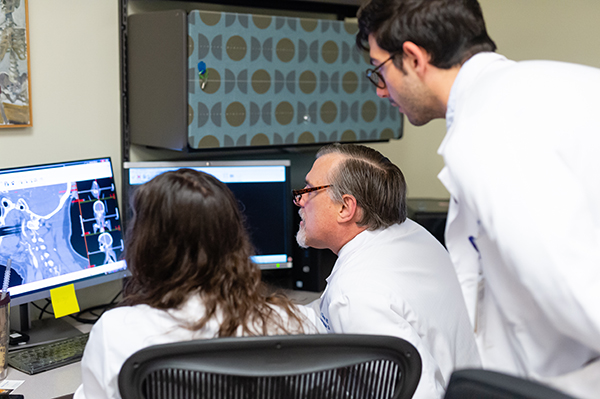
Vascular Surgery Fellowship
Learn MoreInnovation
Innovation is at the core of vascular and endovascular surgery. The UVA Division of Vascular and Endovascular Surgery is at the forefront of innovative technology striving to advance and improve patient care. We offer state-of-the art therapies with minimally-invasive endovascular techniques. We continue to research ways to improve patient safety and outcomes in these procedures.
The Aortic Center’s multidisciplinary team offers customized patient-centered treatment options for patients with a variety aortic conditions. This includes the latest in fenestrated and branched endograft devices. We continue to research way to reduce and potentially eliminate radiation exposure during complex endovascular aortic procedures. Currently, endovascular aortic surgery is performed using two-dimensional grayscale fluoroscopic images, innovative augmented reality and electromagnetic tracking systems technology are being used to reduce radiation exposure and advance care of patients with aortic disease.
We are beginning to look at using these technologies for procedural image guidance in a way that may someday eliminate the need for radiation all together to perform minimally invasive, complex vascular procedures.
Vascular & Endovascular Surgery Research
Our group’s commitment to patient-centered research begins with continual review of institutional, regional and national quality and results. Examples of our UVA medical center investigation include national presentations regarding how socioeconomic features affect vascular surgery results, treatment of popliteal entrapment, MALS, TOS and hybrid repair of complex aortic aneurysms. We participate in the leadership of the VVSG and the SVS VQI and recent projects include investigation of how tick-borne illness, prevalent in Virginia, might affect biologic tissue used for arterial reconstructions leading to early failure. This has led to multiple clinical grant proposals and work. On the national level, we participate in SVS VQI VISION assessing matched data from the VQI with patient’s medicare claim information allowing longer-term analysis of patient-related outcomes. A current example of this is a project led by UVA Vascular and Endovascular surgery looking at national data on results of various surgical strategies treating patients with both carotid stenosis and coronary artery disease.
UVA vascular and endovascular surgery participates in many major clinical trials. These include trials of major aortic endograft devices to treat aortic aneurysm or dissection and encompass newer branched and fenestrated devices. Trials of technologies to enhance autogenous vein bypass grafts and use of new tissue-engineered human acellular scaffolds as bypass grafts are beginning. We are proud of our active participation and leadership in many trials bringing novel features of treatment to our patients.
We are in the initiation phase starting to develop a focus on non-radiation associated procedural image guidance for catheter-based interventions. Our translational research facilities provide us an arena to perform preliminary experiments and develop large-animal protocols for image guidance and endovascular procedure management.
Charitable Giving
Support Vascular and Endovascular Surgery
Give TodayOur patients, now and in the future, are why our work at UVA Vascular and Endovascular Surgery matters. Every vascular surgeon and our researchers are dedicated to better results for patients. Our work to train the future leaders in vascular and endovascular surgery will be a monumental part of our legacy. Your contribution, whatever its size, can help ensure we are able to offer the best care based on advanced medical research. You can also contribute to our educational mission assuring the success of young men and women pursuing a career in vascular and endovascular surgery at UVA. If you would like to learn more about supporting UVA Vascular and Endovascular Surgery, contact either the UVA Health Foundation or UVA Medical School Foundation:
UVA Health Foundation
Vascular and Endovascular Surgery
P.O. Box 800773
Charlottesville, VA 22908-0773
(434)924-8432 or
(800)297-0102
uvahealthfoundation@virginia.edu
UVA Medical Alumni Association and Medical School Foundation
Vascular and Endovascular Surgery Education Fund
Kenneth J. Cherry Lectureship and Education Fund
P.O. Box 800776
Charlottesville, VA 22908
434-924-1734
https://www.uvamedalum.org/giving

